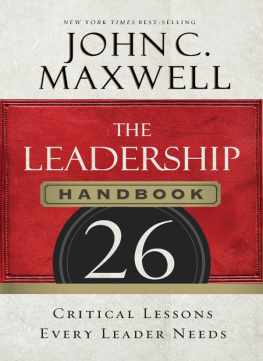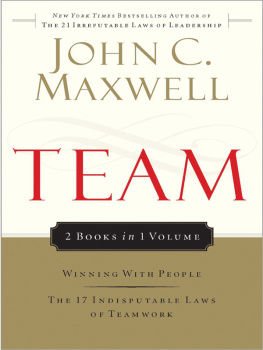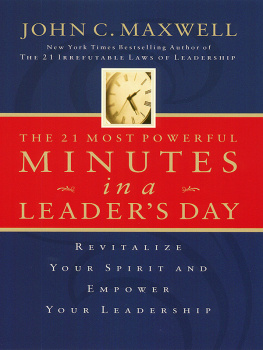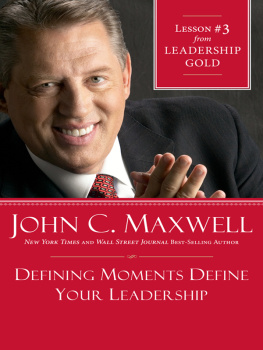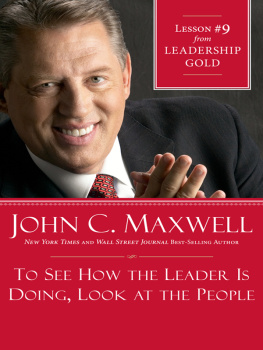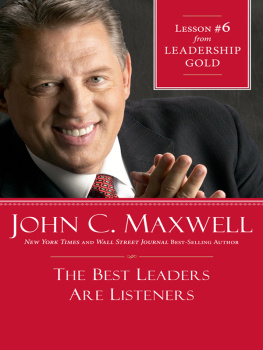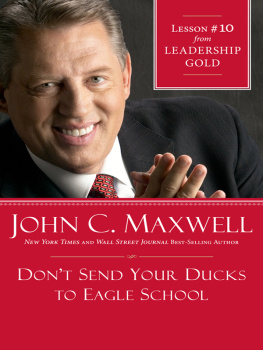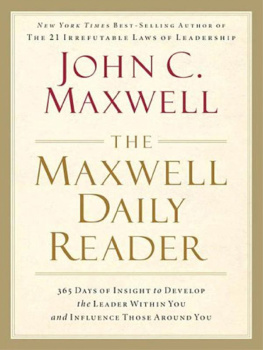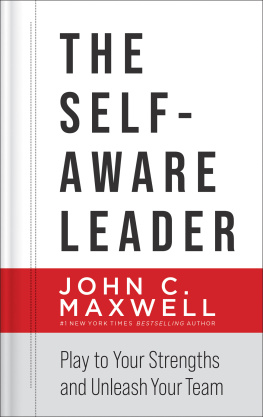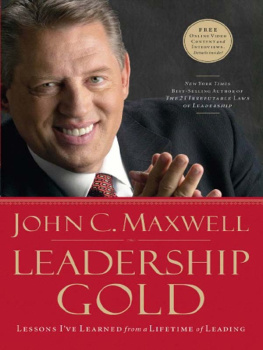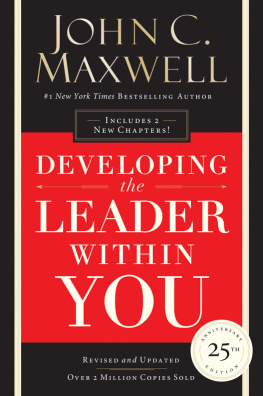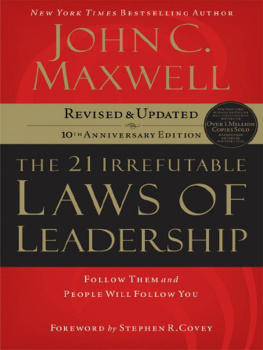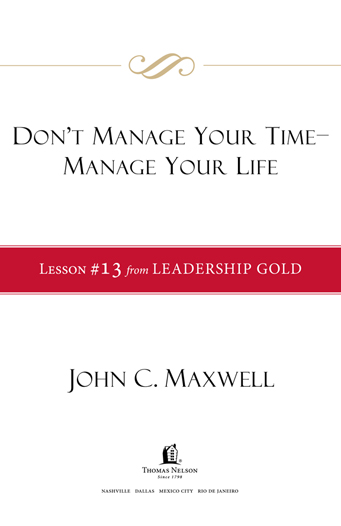
2008, 2012 by John C. Maxwell
This ebook is derived from Leadership Gold, by John Maxwell, 2008, 2012 by John C. Maxwell.
All rights reserved. No portion of this book may be reproduced, stored in a retrieval system, or transmitted in any form or by any meanselectronic, mechanical, photocopy, recording, scanning, or otherexcept for brief quotations in critical reviews or articles, without the prior written permission of the publisher.
Published in Nashville, Tennessee, by Thomas Nelson. Thomas Nelson is a registered trademark of Thomas Nelson, Inc.
Published in association with Yates & Yates, www.yates2.com.
Thomas Nelson, Inc. titles may be purchased in bulk for educational, business, fund-raising, or sales promotional use. For information, please e-mail SpecialMarkets@ThomasNelson.com.
ISBN: 978-0-7852-1411-3 (hardcover)
ISBN: 978-1-4185-7113-9 (ebook)
ISBN: 978-1-4002-7546-5 (ebook of chapter 13)
CONTENTS
DEDICATION
Leadership Gold is dedicated to Ella Ashley Miller, our fourth
grandchild. Her gentle nature continually draws us to her. We pray that
as she grows older she will mine the gold out of the lessons of life.
Thank you to
Charlie Wetzel, my writer
Stephanie Wetzel, who proofs and edits the manuscript
Linda Eggers, my assistant
DONT MANAGE YOUR TIME
MANAGE YOUR LIFE
Early in my leadership years, I realized that my ability to maximize my time would be essential to my productivity and my effectiveness as a leader. As Peter Drucker said, Nothing else distinguishes effective executives as much as their tender loving care of time.
Because I knew I needed to improve in this area, I attended a time-management seminar. I learned many valuable lessons that day. One of the things that struck me and that has stuck with me for more than thirty years was the analogy the presenter used to describe time. He said that our days are like identical suitcases. Even though they are all the same size, some people are able to pack more into them than others. The reason? They know what to pack. We spent most of that day learning about what to pack in the time allotted to us.
CHANGE IN PERSPECTIVE
I left that seminar with two impressions: First, time is an equal-opportunity employer; everybody gets twenty-four hours a dayno more, no lessbut not everybody gets the same return on their twenty-four hours. Second, there really is no such thing as time management. The term is an oxymoron. Time cannot be managed. It cannot be controlled in any way. It marches on no matter what you do, the way the meter in a taxi keeps running, whether you are moving forward or standing still. Everyone gets the same number of hours and minutes every day. Nobodyno matter how shrewdcan save minutes from one day to spend on another. No scientistno matter how smartis capable of creating new minutes. Even with all his wealth, someone like Bill Gates cant buy additional hours for his day. And even though people talk about trying to find time, they need to quit looking. There isnt any extra lying around. Twenty-four hours is the best any of us is going to get.
You cant manage your time. So what can you do? Manage yourself! Nothing separates successful people from unsuccessful people more than how they use their time. Successful people understand that time is the most precious commodity on earth. As a result, they know where their time goes. They continually analyze how they are using their time and ask themselves the question, Am I getting the best use out of my time?
Even though most people would acknowledge that time is finite, I think the majority of them dont really understand its value. In his book What to Do Between Birth and Death: The Art of Growing Up, Charles Spezzano writes, You dont really pay for things with money, you pay for them with time. In five years, Ill have put enough away to buy that vacation house we want. Then Ill slow down. That means the house will cost you five yearsone-twelfth of your adult life. Translate the dollar value of the house, car, or anything else into time, and then see if its still worth it.
GOOD LEADERS CANNOT BE BAD SELF-MANAGERS
People squander their time when they do things that bring them little or no positive return. Thats bad enough when followers do it, because they waste their lives and squander their potential. But when leaders do it, they not only hurt themselvesthey squander the potential of their people!
Ive noticed that people who manage themselves poorly often are guilty of the following three things:
1. They Undervalue Their Uniqueness Doing What Others Want Them to Do
Poet Carl Sandburg advised, Time is the most valuable coin in your life. You and you alone will determine how that coin will be spent. Be careful that you do not let other people spend it for you. As I mentioned in chapter 7, early in my career I allowed others to influence how I spent that coin. As a result, I was busy but terribly ineffective. I was fulfilling others expectations instead of doing what I was gifted to do!
As a leader, I want to make a difference. I want to make an impact. Dont you? My leadership went to a new level when I focused more on fulfilling my vision than fulfilling others expectations. I believe I have been put on earth to do some specific things. I cant do those if Im trying to be what others want me to be and doing a poor job of it at that. I need to make my own unique contribution. No one else can do that for me.
People sometimes dont understand why I protect my calendar so fiercely and why I refuse some requests. Im not just being contrary. I am very mission-minded. I know what I do well and what I dont. My time is limited, and I want to make the most of it. I wont let others put me in the box of their expectations. If you want to be an effective leader, you need to keep others from doing that to you!
2. They Ruin Their Effectiveness by Doing Unimportant Things
Essayist Henry David Thoreau wrote, It is not enough to be busy. The question is, What are we busy about? How do you judge whether something is worthy of your time and attention? For years I have used this formula to help me know the importance of a task so that I can manage myself effectively. Its a three-step process:
Step One: Rate the task in terms of importance:
Critical = 5 points
Necessary = 4 points
Important = 3 points
Helpful = 2 points
Marginal = 1 point
Step Two: Decide the tasks urgency regarding when it must be done:
This month = 5 points
Next month = 4 points
This quarter = 3 points
Next quarter = 2 points
End of year = 1 point
Step Three: Multiply the rate of importance times the rate of urgency. Example: 5 (critical) X 4 (next month) = 20.
I then judge when I should complete the task according to the following scale:
A = 1625 Critical task to be finished by end of month
B = 915 Important task to be finished by end of quarter
C = 18 Low priority to be finished by end of year
One of the things youll notice about this system is that there are no tasks that must be completed by the end of the day or week. Why? Because I am always trying to plan my time at least a month in advance. Leaders should be looking farther ahead than others in the organization. If leaders are always reacting to crises in the moment, the people and the organization will suffer.
3. They Reduce Their Potential by Doing Things Without Coaching or Training
Anything worth doing is worth doing better. I am always amazed when people try to accomplish anything without benefiting from the wisdom of someone who is ahead of them in the journey. Training, coaching, or mentoring can make a huge difference in how productive people can be with the time they have.
Next page

